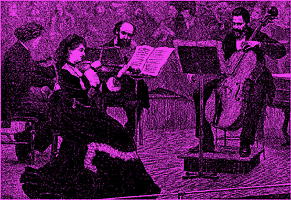
Pianist works magic with Juilliard
Jones energizes quartet's Schumann
Joshua Kosman, Chronicle Music Critic
Saturday, April 28, 2001
©2002 San Francisco Chronicle
URL: http://www.sfgate.com/cgi-bin/article.cgi?f=/chronicle/archive/2001/04/28/DD140984.DTL
One of pianist Warren Jones' principal duties as the finest accompanist on the musical scene is to make a wide range of singers sound their very best. Thursday night in Herbst Theatre he showed that even without his accompanist's hat on, he can do the same for string quartets.
The occasion was a recital by the Juilliard String Quartet, sponsored by San Francisco Performances, and for the first half of the evening the ensemble -- violinists Joel Smirnoff and Ronald Copes, violist Samuel Rhodes and cellist Joel Krosnick -- gave reasonably alert, engaging performances of music by Beethoven and Ruth Crawford Seeger.
But as soon as Jones joined the group after intermission for Schumann's Piano Quintet, the recital soared to a whole new level. Now there was majesty and vigor where there had mostly been rough-hewn force; finesse and clarity replaced mere understatement.
How did he do it? I don't know. The chamber textures in Schumann's score are dense and closely wrought, giving the pianist few opportunities to step into the spotlight and shine.
No, the Jones magic is something that, like a subatomic particle, must be inferred from its effects rather than observed directly. And those effects were evident from the opening measures of the quintet, a full-voiced introductory flourish that established a tone of weighty intensity for the entire first movement.
The follow-through was every bit as gripping, as the ensemble brought brilliance and flair to Schumann's writing. The slow movement, a dark funeral march with intermittent glimmers of light, shone in lugubrious nobility, and the two fast final movements sped along with headlong rhythmic momentum.
The first half was notable for the inclusion of Crawford Seeger's great String Quartet of 1931, the crowning achievement of her sadly abridged compositional career and one of the landmarks of midcentury American modernism.
This score's rugged brand of lyricism came through most winningly in the first two of its four movements, their angular melodies and dissonant counterpoint delivered with fierce determination. As the performance progressed, though, a listener began to suspect that the performers -- Smirnoff in particular -- were making things even more abrasive than necessary.
Certainly the opening performance of Beethoven's Quartet in B-Flat, Op. 18, No. 6, was notable more for its rough-and-tumble energy than for any qualities of elegance or balance. Only the slow introduction to the finale, titled "La Malinconia" ("Melancholy"), found the group playing at its best.
E-mail Joshua Kosman at jkosman@sfchronicle.com.
©2002 San Francisco Chronicle